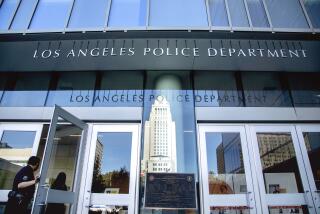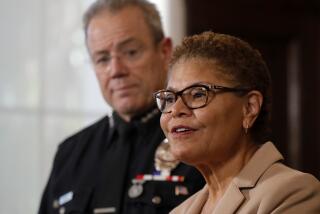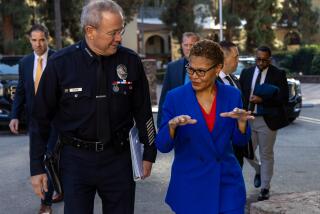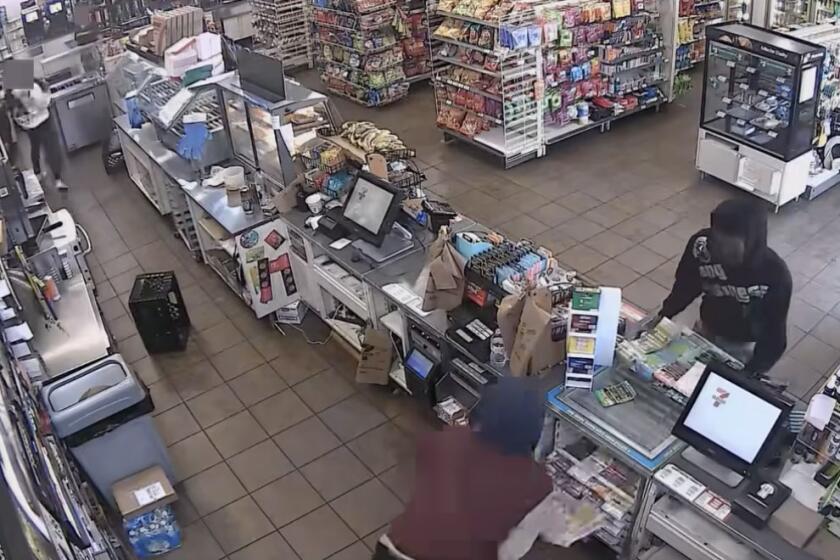Crime rise puts LAPD in a difficult position
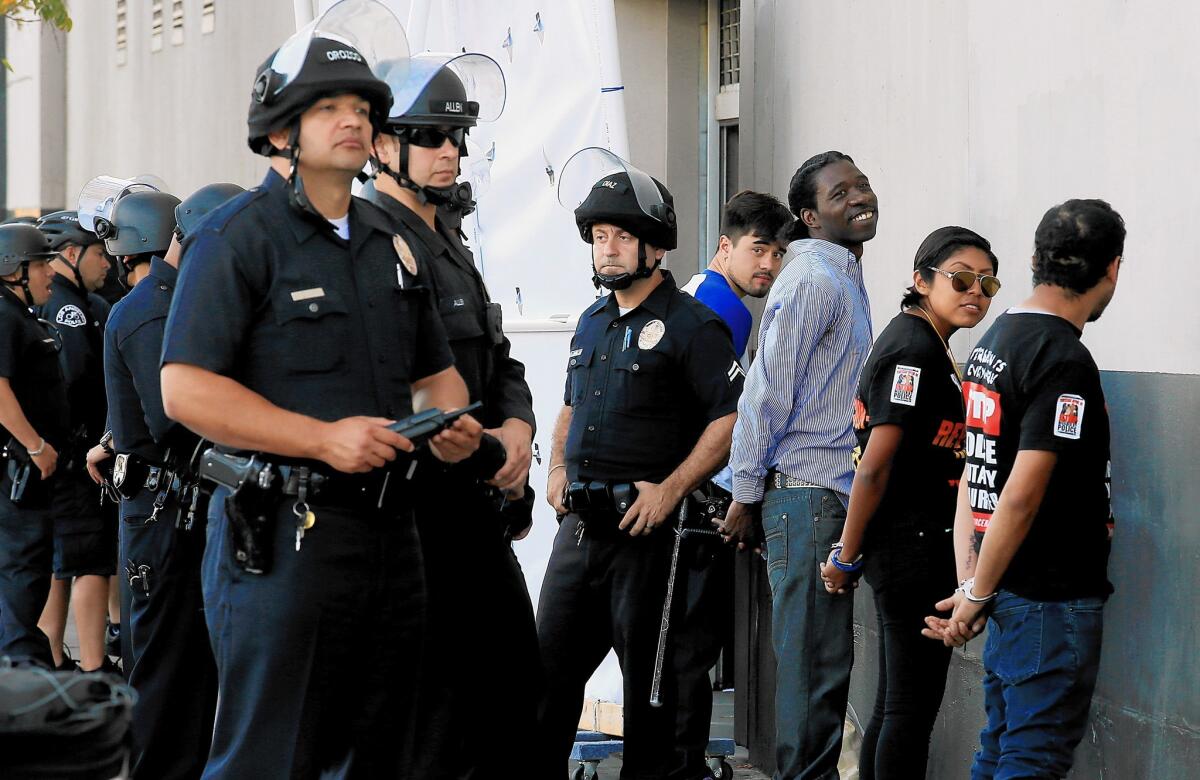
The city’s first major crime increase in more than a decade has Los Angeles Police Chief Charlie Beck trying to maintain a delicate balance.
He wants to swarm high-crime neighborhoods with more than 200 highly trained officers from the elite Metropolitan Division without undermining years of progress the department has made in building better relationships with those communities.
The new crime-fighting strategy will be data-driven, Beck said, with deployments based in part on the crime pattern algorithms known as “predictive policing.”
Parachuting reinforcements into unfamiliar territory on this scale marks a change from the LAPD’s longtime community policing tactic of using beat cops to patrol neighborhoods. Metro officers are known more for their specialized tactical and weapons training than for their skills in building relationships with residents.
But some experts said the LAPD had little choice given the rising crime numbers.
The key, they said, is showing strength without alienating residents.
“They’ve got to do a dual attack,” said Geoffrey Alpert, a professor in the criminology and criminal justice department at the University of South Carolina. “Sometimes that requires going in and dealing with the criminal element.”
Los Angeles Police Commission President Steve Soboroff acknowledged the change is not ideal, but said something has to be done given the deteriorating situation in some areas.
Citywide, violent crime is up 26% and property crime is up 11%. While homicides are slightly down, the number of shooting victims has jumped 24% so far this year compared with the same period in 2014.
“It’s necessary, and I’m really sorry that it is,” Soboroff said. “It is a reaction to a rise in crime.”
If crime begins to fall, “I’d be the first one to stand up there and say, ‘This isn’t necessary anymore,’” he said.
The change, announced by Mayor Eric Garcetti in his State of the City address Tuesday night, sparked debate both inside and outside the LAPD. Critics are expressing concern about how the deployment will be perceived, especially in the wake of recent high-profile police shootings of black men both in Los Angeles and elsewhere.
Connie Rice, a longtime civil rights lawyer who has partnered with the LAPD on community policing strategies, praised Beck for embracing “relationship-based policing.” Under that approach, Rice said, officers “consider it a failure when they make an arrest.”
But she questioned whether Metro cops would have the same mindset.
“The Metro officers are a super paramilitary version of policing. They are not the cops who have relationships and know the communities,” Rice said. “They tend to be very aggressive, historically. They don’t get to know a community.... They don’t get to know the people they police or, for that matter, the local officers.”
“Paramilitary” policing remains a sensitive topic, particularly in South Los Angeles. In the 1980s and early 1990s, the LAPD under then-chief Daryl Gates faced criticism for using military-style vehicles and organizing massive “gang sweeps” in South L.A. that resulted in hundreds of arrests on a given night.
After the 1992 Los Angeles riots, the LAPD sought to end those tactics and work more cooperatively with community groups.
In an interview Wednesday, Beck said the new initiative will look nothing like the hard-charging Metro operations of the past. The incoming crop of Metro officers will have more progressive training, Beck said.
“I don’t think they’re going to carry the same general philosophy that Connie associates with 1980s Metro,” he said.
Soboroff agreed: “They are not Ferguson-like. They are not South Carolina-like. Our training — sensitivity training, use of force training — is off the charts. I would be concerned if that was not the case.”
Under the new plan, Metro officers will not be going into neighborhoods with an aggressive plan to increase arrests, LAPD officials said. Rather, their presence is designed to send a message that the LAPD is nearby and ready to respond. They will focus largely on violent and gang-related crime.
The Metro officers will be assigned to one of the LAPD’s four geographic bureaus, so they will get to know the communities they police, Beck said.
“These are the same cops that were patrolling neighborhoods before. They’re just given a slightly different mission,” Beck said. “I’m not hiring mercenaries from outside the Police Department. I’m changing the mission of the good cops that we have.”
The department will also create a Community Relations Division, expanding efforts to reach local youth through Girl Scout programs, sports, scholarships and providing basic needs like vision care. “The department is going to focus on building relationships as we move forward,” Beck said.
Garcetti also moved Wednesday to ease concerns about what the new deployment would mean for the residents in high-crime areas.
“I want to be very clear: Having more police officers there is not about having a greater presence in terms of an occupying force,” Garcetti said. “This is about making sure that we have cops that we know, and that can immediately make a crime spike not become a crime wave.”
Deploying Metro as a solution to the LAPD’s worst problems is nothing new, and Metro officers have already been responding to crime hot spots in a more limited way. When Chief William J. Bratton arrived in 2002, he sent Metro forces to South L.A. to combat a homicide epidemic.
In 2007, Metro suffered a public black eye when officers swung batons and fired dozens of rubber bullets at a May Day immigration protest in MacArthur Park, injuring hundreds in what the department admitted was a breakdown in discipline.
In years since, Metro has shrunk to about 200 officers from a high of 350.
The addition of 200 officers from elsewhere in the LAPD means the division size will double.
Given the national debate over the last year about policing, Alpert said there are risks that come with deploying more specially trained officers on city streets.
Those risks are of particular concern in Los Angeles, he said, given the troubled history of the LAPD and the changes it made under federal oversight following the Rampart scandal in the late 1990s.
“L.A.’s the epicenter,” he said. “ Everybody looks at L.A. because of what’s happened since the consent decree. L.A. has done a good job, but it seems to be slipping back a little bit.”
Times staff writer Peter Jamison contributed to this report.
More to Read
Start your day right
Sign up for Essential California for news, features and recommendations from the L.A. Times and beyond in your inbox six days a week.
You may occasionally receive promotional content from the Los Angeles Times.
